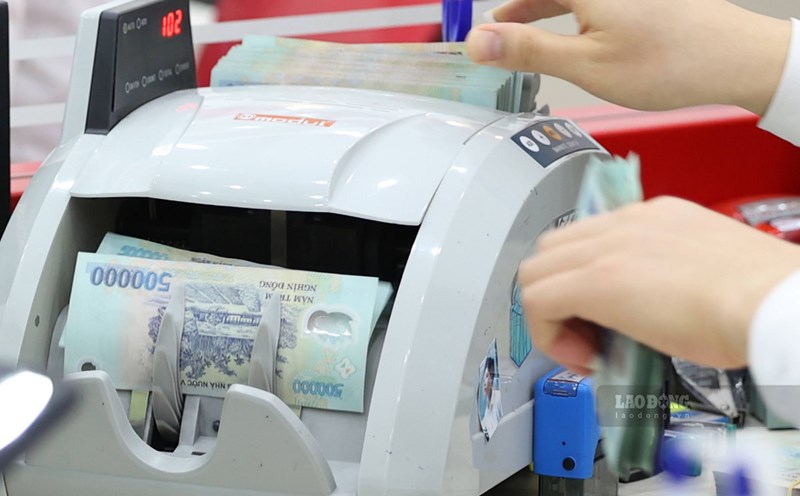Bad debt and reserve costs affect VIMC's profits
Vietnam Maritime Corporation (VIMC) is the enterprise managing the shipping fleet, large seaport systems and logistics units. However, the business activities of enterprises have also fluctuated every year.
In 2023, VIMC achieved consolidated revenue of VND12,820 billion, down more than 10% compared to 2022; profit after tax only reached VND1,701 billion, down nearly 33%. Port exploitation, sea services and sea transportation activities have all decreased significantly.
By 2024, the business activities of enterprises will improve. Consolidated revenue reached more than VND 16,969 billion, profit after tax reached VND 2,629 billion.
In the first half of 2025, VIMC recorded a consolidated net profit of VND 8,300 billion, up slightly from VND 8,269 billion in the same period last year; however, consolidated profit after tax was VND 1,016 billion, down more strongly by 37% compared to the same period last year.
Regarding financial situation, as of the end of the second quarter of 2025, VIMC has set aside a short-term collection reserve of VND 379.1 billion, including deposits at Denmar Chatering & Trading GmbH Company (16.6 billion VND), DIC TM Investment Joint Stock Company (VND 29.8 billion), Nam Trieu Shipping Company Limited (VND 21.9 billion) and many other subjects (VND 74 billion). The deposit to the seller must also be made in advance related to Bach Dang Shipbuilding Company (49.2 billion VND). These are all bad debts, reflecting financial risks that have not been completely handled for many years.
In addition, the enterprise also set aside a reserve to reduce inventory prices of 204 billion VND and a long-term financial investment reserve of 24.3 billion VND. The total of these reserves significantly reduces profit results, and at the same time shows that the burden of bad debt and capital efficiency are still a big challenge for VIMC.
Vietnam Railway Corporation has returned to profit, accumulated loss is still at more than VND 2,000 billion
Vietnam Railways Corporation (VNR) manages thousands of kilometers of national railways, playing a key role in passenger and cargo transportation. However, business results over the years show that the picture still has many dark colors.
In the period of 2020 - 2022, VNR continuously suffered losses with a negative level of more than 1,300 billion VND in 2020, a loss of 585 billion VND in 2021 and nearly 112 billion VND in 2022. This is a difficult time for the railway industry when transportation demand decreases sharply and operating costs increase.
By 2023, VNR began to make a profit again. Consolidated revenue reached VND 8,806 billion, profit after tax reached VND 76.7 billion, ending three consecutive years of losses. This result is mainly due to the recovery of passenger transport.
Entering 2024, the results are more positive. Consolidated revenue reached VND9,788 billion, up more than 11% over 2023; profit after tax reached VND132 billion, up over 72% and the highest level since 2019.
However, these figures are still not enough to cover the previous prolonged losses. As of the end of 2023, VNR still has a cumulative loss of VND2,080 billion, almost unchanged compared to 2022. The efficiency of capital use is low, with the profit after tax/equity ratio in 2023 only reaching 0.34%.
VEC records increased profits, the burden of interest is still heavy
The consolidated financial report for 2024 shows that Vietnam Expressway Corporation (VEC) achieved good business results compared to the previous year. Net revenue reached VND 6,227.7 billion, up 22.7% compared to VND 5,076.3 billion in 2023. In particular, service revenue - the main source of revenue from expressway exploitation - reached VND 6,138.8 billion, an increase of nearly 24% over the previous year; while revenue from construction and installation activities and other revenue decreased to VND 88 billion and VND 855 million, respectively.
The cost of goods sold in 2024 will reach VND2,624.3 billion, up 16% over the previous year. Meanwhile, revenue increased more strongly, helping gross profit reach VND 3,603.4 billion, up 28% compared to 2023, showing that the core operational efficiency of the enterprise has improved.
In the financial sector, revenue decreased from VND 752.1 billion to VND 508.4 billion, mainly due to reduced deposit and lending interest to VND 497.2 billion, the company also did not record dividends in the year. In contrast, financial expenses increased by nearly 13% to VND 3,015.9 billion, of which interest expenses accounted for VND 1,720.6 billion and exchange rate differential losses reached VND 1,295.4 billion, nearly double the previous year. This is the main reason for narrowing financial profits.
After deducting tax expenses, VEC's after-tax profit reached VND 725.1 billion, up 16.8% compared to 2023.
Thus, the results in 2024 show that VEC has significantly improved its service exploitation activities, thanks to a sharp increase in revenue and gross profit. However, exchange rate fluctuations and the burden of interest rates continue to be a big challenge, causing financial costs to account for a high proportion. Enterprises need to effectively handle exchange rate risks and restructure debt to maintain growth momentum in the coming years.









